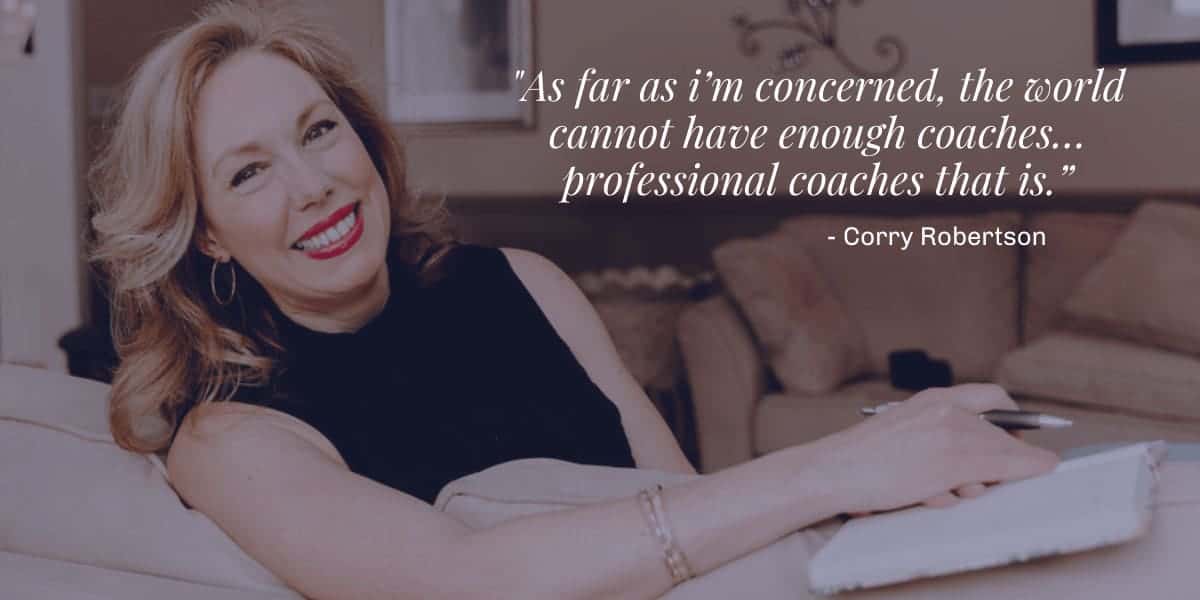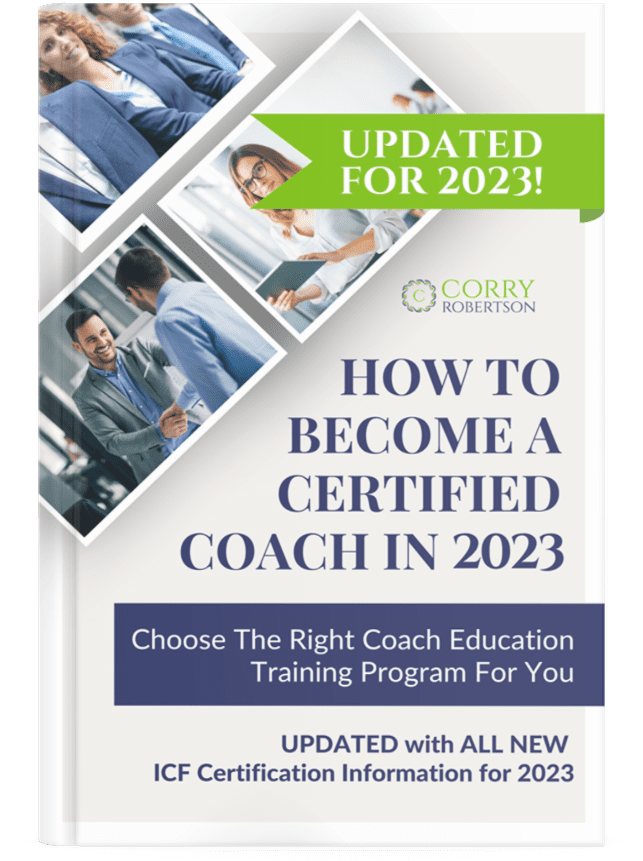Updated Nov 15th, 2023 with New ICF Accreditation Information!
5 Minute Read
Table of Contents
What is Ethical Practice in Coaching
Definition of Coaching
Types of Coaches
How To Become A Coach
What is the ICF
Certification and Credentialing Through the ICF
Levels of Credentials: ACC, PCC, MCC
Continuing Coach Education: CCE
ICF Changes – Updates To Credential Pathways
How to choose the right coach training program
How To Become A Certified Coach: Understanding ICF Credentials and Certification Programs
Recently I’ve been asked, “How do I BECOME a certified coach, what’s the path?”.
Getting a coaching certification and credentials can be confusing, for sure.
Understanding why you should be certified (and by whom), the different levels of credentials and how to choose the right program is important both for people who want to become coaches and also for those who want to hire a coach.
So let’s demystify the process! Along the way, we’re going to talk about what the term “coach” really means, and how that ties into ethics in coaching.
Ethically, who gets to call themselves a coach?
Have you noticed that “coaches” are coming out of the woodwork these days?
I don’t know about you but every time I look at one of my social media channels I see someone else promoting coaching services or coach training services.
All too often when I look at their profile to find out more about their coach qualifications I find out they are not offering coaching services at all but rather consulting, training, workshops or a mix of the three.
When it comes to coach training there are way too many people out there that have ZERO credibility and make empty promises about establishing lucrative coaching businesses.
Coaching and ethical practice go hand in hand. Behaving in an ethical way is foundational and essential if you are going to present yourself as a coach or offer coach training courses.
What is ethical practice in coaching?
Ethical practice is part of a coach’s professional foundation and certified coaches sign off on these practices when we enter the profession.
Professional coaches pledge to be honest about their qualifications, credentials and experience.
Professional coaches know the distinctions between coaching, consulting, training, psychotherapy and other support modalities so we know how to avoid entering conversations that we are not qualified to deal with.
We know how and when to reinforce boundaries when needed and refer clients to other support professionals, as appropriate.

What is the definition of coaching?
Coaching is working through a thinking process. Being a coach means partnering with another person in a thought-provoking and creative conversation that inspires them to maximize their personal and professional potential, which is particularly important in today’s uncertain and complex environment.
Coaches honour the other person as the expert in his or her life and their work and believe that they are creative, resourceful and whole.
Standing on this foundation, the coach’s responsibility is to: discover, clarify, and align with what the person wants to achieve, encourage self-discovery, elicit solutions and strategies generated by the other person (not the coach) and hold the person responsible and accountable.
This process helps people dramatically improve their thinking and outlook on work and life while drawing out their skills and unlocking their potential.
Coaching is not training, consulting, advising, or therapy
Let’s help define what coaching IS by clarifying a few things that it is NOT.
Coaching is not:
Consulting and Advising: A person engaged to provide professional information, recommendation and direction.
Teaching: To cause someone to know something by providing new information.
Therapy, or psychotherapy: The treatment of a mental or emotional disorder. Read: When To Refer A Client To Therapy here.
Telling: To reveal, disclose, divulge, tell, betray, to make known what has been concealed.
Directing: To cause to turn, move, or follow a course.
Ministering: Religious context, aid or support.
Mentoring: Sharing insights from personal experience.
What types of coaches are there?
There are many ways that you can serve as a coach:
External coach practitioner:
This is a coach who is in private practice and works with clients on a contract basis.
Internal coach practitioner:
This is an employed person, where coaching is part of their job description and they conduct coaching sessions with other employees who are not their direct reports.
Managers who use coaching as a leadership style:
These are leaders who prefer and will favour the coaching approach over directing, telling and using a command and control style.
Coaching does not require subject matter expertise
You will notice that I did not list niches like: business coach, marketing coach, life coach, financial coach, sales coach, etc.
This is because these are sub-specialties that imply a subject matter expertise.
You need to hire a subject matter expert when you have little or no knowledge or experience with a problem that needs a solution so the expert comes in to tell you how to solve the problem or solve it for you.
Or, you might hire a trainer who will come in and teach you the steps you need to take to solve the problem in the future.
In the purest sense, coaches do not need subject matter expertise to coach because we are not consulting or teaching.
That being said, many professional coaches have a specialty and that is perfectly ethical if the coach is qualified in the subspecialty.
In this instance, the professional will primarily be a coach or a consultant and will clearly communicate to the client where the boundaries between the two are.
Often a professional coach with subject matter expertise will share their knowledge with the client but is comfortable letting the client stay in the driver’s seat when it comes to what they want to do with the information.
What is not ethical is when a subject matter expert uses the title ‘coach’ when they have no coach specific training.
In this case, you would be getting advice, consulting, training or a mix of the three – but not coaching.
While consulting and training are much needed services on the market, if the professional does not have coach training, you will not be getting coaching.

So how do coaches become coaches, ethically?
Coaches become coaches by earning the title thorough study, practice, ongoing self-improvement and ongoing credentialing.
In its simplest form, to become a coach an individual must get certified coach training, and then they are eligible to earn a credential through the International Coach Federation (the ICF).
Credentialing is the process of obtaining, verifying, and assessing the qualifications of a practitioner. Credentials are documented evidence of education, training, and experience.
This is important to know if you are interested in hiring coaches to work with your employees or if you are thinking about becoming a coach.
If you are responsible for hiring coaches to come in and work with your employees, it is 100% essential that they have an ICF credential or at least are actively in the pursuit of earning one.
If your candidate does not have a credential or is not working on one, they are simply not a coach but rather a consultant, advisor or trainer.
If you or one of your employees has coaching in their job description, then coach specific training is essential for them to be able to fill that function of their role.
What is the ICF?
The International Coaching Federation, (or ICF) itself does not provide training but it does oversee the standards of training programs.
In 2021, the ICF made significant changes to its accreditation requirements, which came into full effect in 2023, and you can read this overview of its credentialing programs highlighted here in a quote from the ICF Website :
In 2021, we took a bold step forward into the future of coaching, launching a new visual brand that reflects our ecosystem – all of which has created to better serve you and equip coaches to continuously improve their transformative work around the world.
ICF continues to offer the most globally recognized, independent credentialing program for coach practitioners. ICF Credentials are awarded to professional coaches who have met stringent education and experience requirements and have demonstrated a thorough understanding of the coaching competencies that set the standard in the profession. Achieving credentials through ICF signifies a coach’s commitment to integrity, understanding and mastery of coaching skills, and dedication to clients.
ICF also accredits programs that deliver coaching education. ICF-accredited education organizations must complete a rigorous review process and demonstrate that their curriculum aligns with the ICF Core Competencies and Code of Ethics.
Specifically, the ICF is recognized worldwide by coaching professionals and the industry as a whole for their work in:
- Developing coaching core competencies
- Establishing a professional code of ethics and standards
- Creating an internationally recognized credentialing program
- Setting guidelines through accreditation for coach-specific training programs
- Providing continuous education through world-class events, Communities of Practice (CPs) and archived learning

How to become an ICF Credentialed Coach
ICF Credential-holders are part of a self-regulating group of elite coaches who provide accountability to clients and the coaching profession as a whole. They pursue and complete rigorous education and practice requirements that provide unquestioned legitimacy to their commitment to excellence in coaching.
As of February 2023, there were 49,970 coaches in 143 countries and territories who hold one of three ICF Credentials and who have done the work.
But many people take one look at the journey and they see that it is quite a commitment, so they opt-out of the process. All too many continue to use the coach title anyway.
Let’s look at the 3 levels of credentials available in the coaching profession, ACC, PCC and MCC.
Associate Certified Coach, ACC
To become an Associate Certified Coach (ACC) you start out by choosing a coach education pathway to achieve your credential. What this means is that you choose a coaching education academy, school, or organization to provide you with the coach training, and this organization must be ICF-accredited.
Once you have achieved all of the requirements listed below from an ICF-accredited organization, then you can apply directly to the ICF to write your exam and have your documents assessed and approved by the ICF, in order to earn your ACC credential.
To achieve your ACC credential, you are required to have:
60+ hours of coaching education
At the ACC level, 60 hours of coach-specific education are required. This education may be earned through one or more ICF–ICF-accredited or non-accredited programs.
10 hours of Mentor Coaching
The Mentor Coaching hours must occur over a three-month period or longer, which may be included as part of your 60 hours of training.
Successful completion (passing score) of a performance evaluation
This evaluation consists of an ICF Assessor’s review of a recorded coaching session with a transcript submitted by the applicant. The coaching session must be with a regular client who has hired you as a coach and not in any other capacity and must last between 20-60 minutes.
100+ hours of coaching experience
Candidates for the ACC Credential must have at least 100 hours of coaching experience following the start of their coach-specific education. The experience hours must have been with at least eight clients, and 25 of the hours must have occurred within the 18 months prior to submitting the credential application. Of the 100 or more coaching experience hours, at least 75 of the hours must be paid.
Successful completion (passing score) of the ICF Credentialing Exam
You will also be required to pass a computer-based written exam administered by ICF Credentials and Standards. The ICF Credentialing Exam is a tool designed to measure a coach’s knowledge of and ability to apply the ICF definition of coaching, ICF Core Competencies and ICF Code of Ethics.
Professional Certified Coach, PCC
To become a Professional Certified Coach, PCC, you build on the work that you did as an ACC. To obtain this credential, you must have:
- At least 125+ hours of coach-specific education through your chosen pathway.
- A minimum of 500 hours (450 paid) of coaching experience with at least 25 clients following the start of your coach-specific training. At least 50 of these hours must occur within the 18 months prior to submitting the application for the credential
- Mentor Coaching, if not completed at the ACC Level, over a minimum of three months to be documented on your online application. Your Mentor Coach must be a PCC or MCC in good standing
- Successful completion of a performance evaluation
- Successful completion (passing score) of the ICF Credentialing Exam
Master Certified Coach, MCC
Building on your ACC and PCC, to become a Master Certified Coach, MCC, you must meet the following requirements:
- At least 200+ hours of coach-specific education through your chosen pathway.
- At least 2,500 hours of coaching experience as of the time you begin your coach-specific education. The experience hours must have been with at least 35 clients, and at least 2,250 of the hours must be paid.
- 10 additional hours of Mentor Coaching over a minimum of three months. Your Mentor Coach must be an MCC in good standing. This cannot be the same Mentor Coaching applied to a previous ICF Credential application.
- You must hold or have previously held, a PCC Credential
- Successful completion of a performance evaluation
- Successful completion (passing score) of the ICF Credentialing Exam

Continuing Coach Education: Your CCEs and Ongoing Development
As part of the coaching ethics and mindset, coaches are dedicated to a lifelong pursuit of keeping their coaching skills fresh and sharp, so we invest in ongoing coach-specific training throughout our careers.
In addition, ongoing coach training and experience are necessary to renew or advance your credentials and maintain them.
You are not obligated to advance your credentials, but you are obligated to keep training if you wish to keep your credential.
Here are the requirements to keep or renew your credential:
- Completion of at least 40 hours of Continuing Coach Education (CCE) in the three years since the initial award of your credential or since your last credential renewal is required.
- At least 24 of the 40 hours of CCEs must be in Core Competencies, with at least 3 of the hours in coaching ethics.
- The remaining 16 hours can be in Resource Development or Core Competencies.
- If you are renewing your ACC for the first time, you need to do 10 additional hours of Mentor Coaching with an eligible Mentor Coach years since the initial award of your credential.
ICF Changes In 2023 – Updates To Credential Pathways
In November 2021, ICF Coaching Education shared some exciting news about their updated accreditation system for coaching education and training programs. The goal? Setting high standards for coach-specific education globally. This new system is stepping in for the old Accredited Coach Training Program (ACTP) and Approved Coach Specific Training Hours (ACSTH) labels, bringing in a tiered structure that matches up with the ICF Credential levels.
As per Luke Davis, Vice President of ICF Coaching Education:
“We are innovating our current global accreditation model to set the highest standards for coach-specific education in the world. Our new structure will enable coaches to find a clearer path to quality education that prepares them for the nuance, complexity, and sophistication of today’s coaching consumer.”
This switch has required all ICF-accredited coaching education programs to go through a new, rigorous evaluation of their education programs. As of 2023, all ICF-accredited coaching education programs must adhere to the new accreditation categories.
Let’s break them down:
Level 1 Accreditation (formerly ACSTH)
is for organizations that offer at least 60 contact learning hours, and it is designated as a pathway to the ACC credential.
Level 2 Accreditation (formerly ACTP)
is for organizations that offer at least 125 contact learning hours, and it is designated as a pathway to the PCC credential.
Level 3 Accreditation
a brand-new offering, is for organizations that offer at least 75 advanced contact learning hours, and it is designated as a pathway to the MCC credential.
The path you use to apply for your credential (ACC, PCC, or MCC) is determined by the type of coach-specific education you receive. All paths have the same five requirements (education, experience, mentor coaching, performance evaluation, and exam).

How to choose the right coaching certification training program
Choosing your coach training and accreditation path comes down to personal preference.
Our training program, The Coaching Academy for Leaders, offers a Level 1 program that has many benefits for students, because of its freedom and flexibility, and its focus on leadership coaching and small group participation.
Personalized, Individual Attention – Because of the small-group focus, you have lots of opportunities to interact directly with the faculty members, and 1-to-1 private coaching is included in the tuition. This program is ideal for managers who are looking for a leadership development program and for aspiring coaches who want to specialize in business or executive coaching and earn the title Certified Leadership Coach.
Focus on Leadership and Executive Coaching – The program focuses on professional coaching, coaching as a leadership style, and coaching culture. So it is of interest to those who want to learn leadership and executive coaching, those who want to learn coaching as a leadership style, and those who want to bring more coaching into their organizations.
You can space out your training – The Coaching Academy for Leaders offers a complete coach training program delivered in 3 phases, meaning you can pace your learning to fit your lifestyle (or your budget), and start or stop your training when you wish
Less upfront cost investment – You may realize that after phase 1, completing the first part of your training that coaching is not for you after all, so you are free to stop investing your time and money, unlike other programs where you pay for the complete program upfront.
Comparing coach education and training programs is not an easy task, there are many options, each with its own benefits and drawbacks. For some learners, the course duration or cost is most important, for others, the delivery method is what tips the balance. And for some students, the focus of the program and course content itself will be the deciding factor.
In order to help you determine the best course for you, have a look at our ICF – Certified Leadership, Executive, and Business Coach Training Programs Compared information here.
Either way, before you drop big bucks and lots of time on a training program make sure that your training of choice is accredited as a Level 1, Level 2, or Level 3 program from the ICF. This will ensure that you get coach-specific training that meets ICF standards.
Conclusion
Why do so many people call themselves “coach” when they aren’t certified?
Simply, because they can. Unlike the professional designations of doctor or lawyer, there is no law against using the title so they don’t feel they are breaking a code of ethics by using a title that they didn’t earn.
People who are not certified but use the term coach are usually well meaning, they believe that they are very good at what they do and deliver great value so there is no harm in saying that what they do is coaching.
But given the investment of time, energy and money that goes into earning credentials, many professional coaches want to clarify what it really means to be a “coach”.
Because anyone can use the title, it’s the buyer who has to know what good quality coaching is and then make sure that they are hiring a qualified person. One of the most important things a buyer can do to set themselves up for the best possible success is to ensure that their coaches have ICF credentials.
If we reserve the title “coach” for those who have earned professional certification, there would be much less confusion in the market about the coaching profession, and more clarity and transparency for those who want to hire a coach, or become one themselves.
Are you looking for an ICF accredited coaching certification program? Have a look at The Coaching Academy for Leaders, or visit our Get Your Questions Answered page and explore if our program is the right fit for you.
_______________________
Did you find this article helpful? You might also like:
A Peek Inside A Successful Leadership Development Program
Psychometric Assessments and Personality Tests for Leadership, Team Building and Recruitment
What Triggers You? Shifting Perceptions, Negativity and Judgement in Your Coaching Practice




